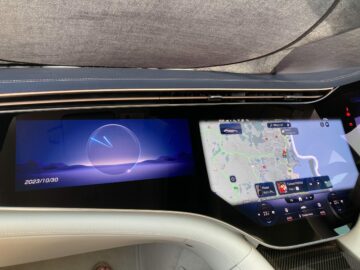Sign up for daily news updates from CleanTechnica on email. Or follow us on Google News!
The electric car revolution in America is undergoing a bit of a pause, as manufacturers try to adjust their product mix to the wishes of their customers. The new car market is made up of several sectors, and the adoption of EV models varies widely depending on what sector you are talking about. Electric SUVs like the Kia EV9 are pretty much what many Americans are searching for in an EV — room for 6 or 7 passengers and their “stuff,” with the possibility of towing a medium-size trailer as well.
Pickup trucks are a hot part of the new car market, but battery electric trucks are not thick on the ground just yet. They tend to be expensive and lack the flat-out grunt needed to tow heavy trailers or carry a lot of cargo compared to their gasoline- and diesel-powered cousins.
Then there are the performance cars, typified by the Ford Mustang, the Chevrolet Camaro, and the Dodge Charger/Challenger twins. So far, no battery electric versions of them have appeared. In fact, the last Camaro has already been built, after Chevrolet watched sales decline over the past few years. Production of the Charger/Challenger twins is slated to end soon-ish. Only the Mustang, the car that started the whole pony car era, is scheduled to remain in production for the foreseeable future.
In a recent interview with Motor Trend, GM president Mark Reuss said that if he has his way, the Camaro will make a comeback as an electric car — not an electric crossover like the Mustang Mach-E. But a final decision on that topic has not yet been made. It will be designed to feature athletic performance characteristics and a low price point, rather than huge horsepower and tire-shredding power. Reuss, whose first car was a 1967 Camaro, said he wants to see the iconic nameplate return to its roots as a pony car with broad appeal beyond hardcore enthusiasts.
Reuss said the price of the Camaro EV could be similar to that of the 2024 Chevrolet Equinox EV compact crossover, which will start at $34,995 when the entry model goes on sale later this year. That’s not any cheaper than the base 2024 Chevrolet Camaro, but factor in a $7,500 federal tax credit and the price effectively drops to $27,495, which would make this hypothetical EV about $5,000 less than the last gasoline-powered Camaro with an infernal combustion engine.
Even if the Camaro comes back, it likely will have four doors, as sales of coupes in America today are hardly more than a rounding error in the sales statistics. Reuss envisions a coupe-like design that also improves on the severely limited outward visibility of the current Camaro. Chevrolet could do everyone a favor by raising the roof four inches or so in order to allow older drivers with creaky knees and hips to get in an out without needing a trip to the chiropractor afterward.
Don’t look for one anytime soon, however. All EV models from GM will be built on the so-called Ultium platform, which currently is just getting into production as the foundation of the Chevy Blazer EV and Equinox EV, as well as the Cadillac Lyriq. There are not enough Ultium batteries available for a low-volume car like the Camaro and won’t be for several years. Nevertheless, Motor Trend says there is little likelihood GM will walk away from the brand equity in the Camaro name, which has had a place in the company’s model lineup for nearly 60 years.
No Way The Mustang Becomes An Electric Car
Ford CEO Jim Farley was in the UK recently to attend the Goodwood Members’ Meeting. While there, he told Autocar that there was a possibility the Mustang might sprout an extra pair of doors sometime in the future. While the Mustang is the best selling coupe in the world at the moment, the coupe market overall is shrinking. He said that any new derivatives would only be accepted by Mustang enthusiasts if they had the “performance and attitude” of existing models.
“We will never build a Mustang that isn’t a Mustang,” he insisted. “For instance, there will never be room for a small, two-row Ford SUV with a Mustang badge stuck on it. But could we do other Mustang body forms – a four-door or whatever? I believe we could, as long as these models have all the performance and attitude of the original.” The key, Farley believes, is building models that are accessible to traditional buyers and in other versions that take the existing car further upmarket — the way that Porsche has done with its 911 GT3 RS and GT2 RS models. “Porsche has been smart about creating derivatives over the past 20 years,” he said.
“But we wouldn’t want to do things their way. We want to give them a good, American-style run for their money.” One way of keeping costs down while increasing performance in the affordable version, he believes, may be to cut weight, and a program to do precisely that is already underway. “At our best, we are an irreverent company. We need to keep doing derivatives that will surprise people.”
Far from making the Mustang an electric car, Farley says Ford intends to continue building V8s “as long as God and the politicians let us.” He promises he will fight to keep these iconic engines and the manual transmissions they are often mated with in production. That being said, he sees a possibility that hybrid power may be offered in some Mustang models to reduce carbon emissions and to improve performance. “We’ve been testing and we really do believe partial electric powertrains work well for performance drivers. One thing I can promise, however, is that we will never make an all-electric Mustang.” Oddly, he does not consider the Mustang Mach-E to be an electric version of the Mustang, and there are plenty of Mustang enthusiasts who would agree.
Volkswagen ID.7 On Hold For America
Volkswagen of America issued a press release on May 22, 2024, that announced the scheduled debut of the ID.7 electric car in North America has been delayed indefinitely. It was supposed to be in US and Canadian showrooms this year. “Volkswagen is committed to making market-driven choices while listening to our customers. As market dynamics continue to change, Volkswagen is delaying the introduction of the ID.7 sedan in the U.S. and Canada. In Europe, the ID.7 has been on sale since 2023 and has become an industry standard, winning various international awards and comparison tests. After the introduction of the ID.7 Tourer, customer demand for the models is higher than expected, especially in Germany.
“In North America, the brand experienced strong sales in Q1, with 27.5 percent growth, driven by its SUV segment. We remain committed to electric mobility — this year we have enhanced the range and performance on our all-electric 2024 ID.4 SUV, and we are thrilled to welcome the iconic Microbus back into our lineup with the arrival of the 2025 ID. Buzz in Q4.”
The Takeaway
Automakers are struggling to adapt to rapidly changing market conditions. GM is saying the Camaro, now out of production, might reappear someday as an electric car with four doors. Ford is sticking with its Mustang for as long as it can but sees it being offered with a hybrid powertrain somewhere down the road. Like the Camaro, it may morph into a four-door car as well. Volkswagen added a very tasty ID.7 sedan and wagon to its electric car offerings last year but now says it will delay bringing the car to North America.
The Cox Automotive 2024 market study assures us the electric car revolution is alive and well, even though it may be delayed by a few years. There is plenty of turbulence in the electric car market today, even without the disruption of low-priced cars from China. Interesting times ahead.
Have a tip for CleanTechnica? Want to advertise? Want to suggest a guest for our CleanTech Talk podcast? Contact us here.
Latest CleanTechnica.TV Videos
[embedded content]
[embedded content]
Advertisement
CleanTechnica uses affiliate links. See our policy here.
- SEO Powered Content & PR Distribution. Get Amplified Today.
- PlatoData.Network Vertical Generative Ai. Empower Yourself. Access Here.
- PlatoAiStream. Web3 Intelligence. Knowledge Amplified. Access Here.
- PlatoESG. Carbon, CleanTech, Energy, Environment, Solar, Waste Management. Access Here.
- PlatoHealth. Biotech and Clinical Trials Intelligence. Access Here.
- Source: https://cleantechnica.com/2024/05/22/us-electric-car-news-electric-camaro-maybe-electric-mustang-never-id-7-not-now/
- :has
- :is
- :not
- $UP
- 000
- 20
- 20 years
- 2023
- 2024
- 2025
- 22
- 27
- 4
- 400
- 5
- 500
- 6
- 60
- 7
- a
- About
- accepted
- accessible
- adapt
- added
- Adoption
- Advertise
- Affiliate
- affordable
- After
- agree
- ahead
- alive
- All
- all-electric
- allow
- already
- also
- america
- Americans
- an
- and
- announced
- any
- anytime
- appeal
- appeared
- ARE
- AS
- assures
- At
- athletic
- attend
- attitude
- automotive
- available
- awards
- away
- back
- base
- batteries
- battery
- BE
- become
- becomes
- been
- being
- believe
- believes
- BEST
- Beyond
- Bit
- body
- brand
- Bringing
- broad
- build
- Building
- building models
- built
- but
- buyers
- by
- CAN
- Canada
- Canadian
- car
- carbon
- carbon emissions
- Cargo
- carry
- cars
- ceo
- change
- changing
- characteristics
- cheaper
- Chevrolet
- China
- choices
- cleantech
- Cleantech Talk
- CO
- Comeback
- comes
- committed
- compact
- company
- Company’s
- compared
- comparison
- conditions
- Consider
- content
- continue
- Costs
- could
- Cox
- Creating
- credit
- Current
- Currently
- customer
- Customers
- Cut
- debut
- decision
- Decline
- delay
- Delayed
- Demand
- Depending
- Derivatives
- Design
- designed
- Disruption
- do
- Dodge
- does
- doing
- done
- doors
- down
- driven
- drivers
- Drops
- dynamics
- effectively
- Electric
- electric car
- embedded
- Emissions
- end
- Engine
- Engines
- enhanced
- enough
- enthusiasts
- entry
- envisions
- equity
- Era
- error
- especially
- Europe
- EV
- Even
- everyone
- existing
- expected
- expensive
- experienced
- extra
- fact
- factor
- far
- favor
- Feature
- Federal
- few
- fight
- final
- First
- flat-out
- For
- Ford
- foreseeable
- forms
- Foundation
- four
- from
- further
- future
- Germany
- get
- getting
- Give
- GM
- God
- Goes
- good
- Ground
- Growth
- Guest
- had
- hardcore
- hardly
- Have
- he
- heavy
- higher
- his
- hold
- HOT
- However
- HTTPS
- huge
- Hybrid
- i
- iconic
- ID
- if
- improve
- improves
- in
- In other
- inches
- increasing
- indefinitely
- industry
- instance
- intends
- interesting
- International
- Interview
- into
- Introduction
- irreverent
- Issued
- IT
- ITS
- Jim
- just
- Keep
- keeping
- Key
- Lack
- Last
- Last Year
- later
- less
- let
- like
- likelihood
- likely
- Limited
- lineup
- links
- Listening
- little
- Long
- Look
- Lot
- Low
- made
- make
- Making
- manual
- Manufacturers
- many
- mark
- Market
- market conditions
- max-width
- May..
- maybe
- meeting
- might
- mobility
- model
- models
- moment
- money
- more
- much
- name
- nearly
- Need
- needed
- needing
- never
- Nevertheless
- New
- news
- no
- North
- north america
- now
- oddly
- of
- offered
- Offerings
- often
- older
- on
- ONE
- only
- or
- order
- original
- Other
- our
- out
- over
- overall
- pair
- part
- partial
- past
- pause
- People
- percent
- performance
- Place
- platform
- plato
- Plato Data Intelligence
- PlatoData
- player
- Plenty
- podcast
- Point
- policy
- Politicians
- Pony
- Porsche
- possibility
- power
- precisely
- president
- pretty
- price
- Product
- Production
- Program
- promise
- promises
- Q1
- raising
- range
- rapidly
- rather
- really
- recent
- recently
- reduce
- remain
- return
- Revolution
- road
- roof
- Room
- roots
- rounding
- Run
- s
- Said
- sale
- sales
- saying
- says
- scheduled
- searching
- sector
- Sectors
- see
- sees
- segment
- Selling
- several
- severely
- similar
- since
- small
- smart
- So
- so Far
- some
- someday
- somewhere
- Soon
- standard
- start
- started
- statistics
- sticking
- strong
- Struggling
- stuck
- Study
- suggest
- supposed
- surprise
- SUVs
- Take
- Talk
- talking
- tax
- tax credit
- tend
- Testing
- tests
- than
- that
- The
- The Future
- the UK
- the world
- their
- Them
- There.
- These
- they
- thing
- things
- this
- this year
- though?
- thrilled
- times
- tip
- to
- today
- told
- topic
- traditional
- trailer
- trip
- Trucks
- try
- turbulence
- tv
- Twins
- u.s.
- Uk
- undergoing
- Underway
- Updates
- us
- uses
- various
- version
- versions
- very
- Video
- visibility
- volkswagen
- vw
- walk
- want
- wants
- was
- Way..
- we
- weight
- welcome
- WELL
- What
- whatever
- when
- which
- while
- WHO
- whole
- whose
- widely
- will
- winning
- wishes
- with
- without
- Work
- world
- would
- year
- years
- yet
- you
- youtube
- zephyrnet











